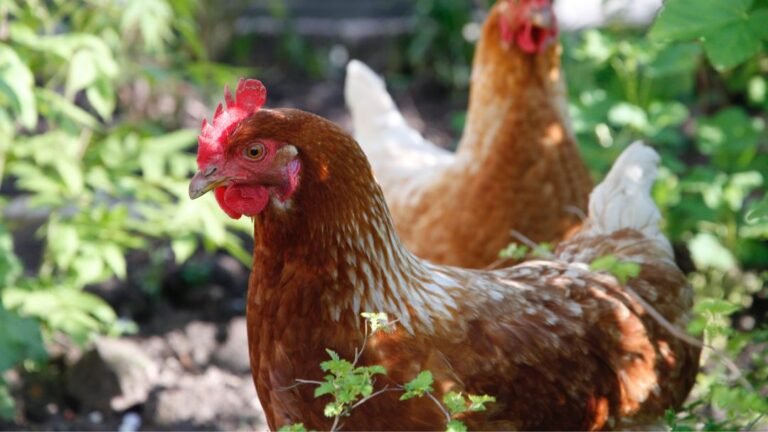Campine chickens are friendly yet flighty, making them an interesting addition to any backyard flock. These beautiful and active birds are known for their sociable nature, but they can also be easily startled and prone to flying away.
Despite their flighty tendencies, Campine chickens are excellent foragers and can bring a lively and energetic presence to the coop. We will explore the unique characteristics of Campine chickens, discuss their care requirements, and provide insights into their behavior. Whether you are a beginner or experienced chicken keeper, understanding the traits of Campine chickens can help you create a happy and harmonious environment for these delightful birds.
So, let’s dive in and discover more about Campine chickens!
A Fascinating History Of Campine Chickens
The Campine chicken is a breed that has captured the hearts of chicken enthusiasts for centuries. Known for its friendly demeanor and striking appearance, the Campine chicken has a history that is worth exploring. In this article, we will delve into the origins of the breed and its cultural significance.
Origins Of The Breed
The Campine chicken originated in Belgium, where it was first bred in the 19th century. Its creation was inspired by the desire for a dual-purpose chicken that excelled in both egg production and meat quality. The breed was developed by crossing local Belgian chickens with imported gamefowl, resulting in a bird with refined features and excellent foraging abilities.
The name “Campine” refers to the region in Belgium from which the breed originated. This area is known for its rich agricultural history and was a prime breeding ground for various livestock, including chickens. The Campine chicken quickly gained popularity not only in Belgium but also in other parts of Europe due to its attractive plumage and productive qualities.
Cultural Significance
The Campine chicken holds great cultural significance, particularly in Belgium. Over the years, the breed has become an integral part of Belgian folklore and traditions. Its striking silver or gold plumage has made it a symbol of prosperity and good fortune in many local celebrations and events.
In addition to its symbolic value, the Campine chicken also played a practical role in Belgian households. Its excellent egg-laying abilities provided families with a steady source of fresh eggs, while its meat was cherished for its delicate flavor and tenderness.
Furthermore, the Campine chicken has captured the attention of poultry enthusiasts around the world. The breed’s curious and active nature, combined with its friendly disposition, makes it a favorite among hobbyists and show breeders alike. Its distinct appearance, characterized by a sleek body, prominent neck feathers, and bright eyes, adds to its charm and popularity in the chicken community.
In conclusion, the Campine chicken’s history is deeply intertwined with Belgian culture and heritage. Its origins in the fertile lands of Belgium and its enduring popularity speak volumes about its exceptional qualities. Whether you are a chicken enthusiast or simply admire the beauty and resilience of these feathered creatures, the Campine chicken is a breed worth knowing and appreciating.
Physical Characteristics Of Campine Chickens
Temperament And Personality Traits
Temperament and Personality Traits
Campine chickens are known for their unique blend of friendly and flighty temperaments. Let’s dive deeper into their personality traits:
Friendly And Social Nature
Campine chickens are naturally friendly and social birds. They enjoy being around people and can often be seen approaching their owners with curiosity and excitement. This friendly disposition makes them a popular choice for those looking for a sociable companion in their flock.
Moreover, Campines are known for their ability to form strong bonds with their human caretakers. They are not just friendly; they also crave attention and affection. Providing them with regular interaction and positive reinforcement can further enhance their sociability.
Flighty And Active Behavior
While Campines are undoubtedly friendly, their flighty and active nature should be taken into account. These chickens have a strong urge to explore and can get easily spooked by sudden noises or movements. As a result, they are often considered flighty and not as easily handled as some other breeds.
Campines are known for their agility and quick reflexes. They enjoy flying short distances and perching on high places. This behavior is a testament to their active and energetic nature. Providing them with ample space to roam and engaging activities to keep them mentally stimulated is essential for their well-being.
Compatibility With Other Breeds
When it comes to coexisting with other breeds, Campines generally maintain a peaceful demeanor. They are not aggressive towards their flockmates and can get along well with a wide range of chicken breeds. However, due to their flighty nature, integrating them into an existing flock might require some careful monitoring and gradual introductions.
It is recommended to introduce Campines to other breeds when they are young, allowing them to grow up together and establish social bonds early on. This helps in minimizing territorial disputes and ensures a harmonious flock dynamic.
Some compatible breeds that can complement Campines’ personality include the calm and docile Cochins, the active and sociable Sussex, and the friendly and curious Rhode Island Reds.
Suitable Environments For Campine Chickens
Campine chickens are known for their friendly nature but also for being somewhat flighty. Creating a suitable environment for these unique birds is crucial to their health and happiness. From the ideal chicken coop setup to considerations for outdoor spaces and weather conditions, here’s what you need to know to provide the best living conditions for your Campine chickens.
The Ideal Chicken Coop Setup
The first step in creating a suitable environment for Campine chickens is setting up the ideal chicken coop. This shelter should provide a comfortable and secure space for your birds to roost, lay eggs, and seek refuge from predators or extreme weather conditions. Here are some key factors to consider:
- Size: The coop should have enough space for each chicken to have at least 4 square feet of floor space. This allows them to move around freely and prevents overcrowding.
- Ventilation: Good airflow is essential to prevent the buildup of ammonia and moisture. Install windows with wire mesh for proper ventilation.
- Lighting: A well-lit coop not only makes it easier for you to collect eggs but also helps regulate your chickens’ reproduction cycles. Natural light is preferred, but you can also use artificial lighting.
- Nesting Boxes: Provide enough nesting boxes, typically one box for every 3-4 hens. These boxes should be filled with clean bedding material for comfortable egg-laying.
- Roosting Bars: Install roosting bars at a height of about 2-3 feet from the ground. Ensure there is enough space for each chicken to comfortably perch.
Outdoor Spaces And Free-ranging
Campine chickens are active foragers and love to explore outdoors. While they can be kept solely in a coop, providing them with access to outdoor spaces and allowing them to free-range can greatly enhance their well-being. Here’s what you should consider:
- Enclosed Run: Create a fenced outdoor run attached to the coop. This will allow your Campine chickens to stretch their wings and enjoy the fresh air while still being protected from predators.
- Foraging Opportunities: Scatter food treats, such as mealworms or vegetable scraps, around the outdoor area to encourage natural foraging behaviors.
- Secure Boundaries: Ensure that the fences or netting used to enclose the outdoor spaces are predator-proof. Regularly inspect and reinforce any weak spots to prevent escapes or intrusions.
Cold And Hot Weather Considerations
Campine chickens are generally hardy birds, but they can still be affected by extreme weather conditions. Whether you live in a cold or hot climate, it’s essential to make appropriate adjustments to ensure their well-being:
| Cold Weather | Hot Weather |
|---|---|
|
|
By setting up the ideal chicken coop, providing access to outdoor spaces, and considering weather conditions, you can create a suitable environment where your Campine chickens can thrive. Remember to regularly check their living conditions and make adjustments as needed to ensure their well-being.
Tips For Raising And Caring For Campine Chickens
Caring for Campine chickens requires understanding their unique needs and behaviors. As friendly as Campines can be, they are also known to be flighty, requiring some special care to keep them happy and healthy. In this article, we will provide some essential tips for raising and caring for Campine chickens.
Feeding And Nutritional Needs
Meeting the nutritional needs of Campine chickens is crucial for their overall health and productivity. To ensure an optimal diet, follow these feeding tips for your Campine flock:
- Provide a balanced commercial chicken feed that is specifically formulated for laying hens. Look for a feed that contains essential nutrients like protein, carbohydrates, vitamins, and minerals.
- Supplement their diet with fresh fruits and vegetables. Campines enjoy treats like lettuce, cucumber, watermelon, and berries.
- Ensure a constant supply of clean, freshwater is available at all times. Chickens need access to fresh water for proper digestion and hydration.
Providing Adequate Exercise
Due to their naturally active and curious nature, Campines require plenty of exercise. Here are some tips to help your Campine chickens stay fit and happy:
- Allow your chickens to free range whenever possible in a safe and secure space. This will provide them with ample opportunity to stretch their legs and explore their surroundings.
- Create an enriching environment in their coop with perches, ramps, and toys. This encourages physical activity and mental stimulation.
- Ensure that the chicken coop and run offer enough space for the flock to move around comfortably. Overcrowding can cause stress and lead to health issues.
Health Concerns And Preventive Measures
Like any other chicken breed, Campines may be prone to certain health issues. To maintain the well-being of your Campine flock, consider the following preventive measures:
- Implement a regular cleaning routine for the coop and run to prevent the buildup of bacteria and parasites.
- Monitor your chickens regularly for signs of illness, such as decreased appetite, abnormal droppings, or changes in behavior. Seek veterinary advice at the first sign of concern.
- Vaccinate your chickens against common diseases, as recommended by your veterinarian.
- Provide proper ventilation in the coop to prevent respiratory issues.
- Practice good biosecurity measures to prevent the introduction and spread of diseases. This includes limiting visitors to your flock, ensuring they wash their hands before and after handling the chickens, and preventing contact with other poultry.
By following these tips for raising and caring for Campine chickens, you can create a happy and healthy environment for your feathered friends. Remember, a well-fed and well-exercised Campine chicken is more likely to thrive and provide a delightful addition to your backyard flock.
Conclusion
Campine chickens are undeniably friendly, but their flighty nature can sometimes be challenging to handle. These beautiful birds have a history of being alert and skittish, making them prone to easily taking flight at the smallest disturbance. However, with proper training and care, Campine chickens can become a delightful addition to any flock.
Remember, patience and consistency are key when it comes to earning their trust and taming their flighty tendencies. So, if you’re looking for a breed that brings both friendliness and excitement to your poultry endeavors, consider the charming Campine chicken!


